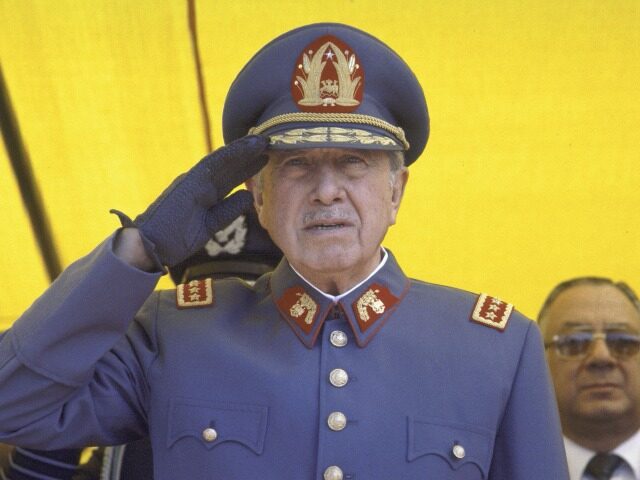Police responding to a shootout between drug-trafficking gangs in Valdivia, Chile, last week, identified one of the weapons confiscated on the scene as having been registered to late dictator Augusto Pinochet.
The firearm, a .380 Pietro Beretta, is registered in the name of Augusto Pinochet, who took power via a coup in 1973 and ruled Chile until 1990. Police had labeled the firearm missing on May 8, 2014, and found the weapon almost nine years later in the possession of a 15-year-old who threw it on the patio of a house inside a bag of drugs as police officers gave chase to him during the operation last week.
Chilean police officers announced on Monday that Pinochet’s firearm was found and seized during an anti-narcotics operation that saw ten men arrested, including two minors.
“In an adjoining house was found a pistol-type firearm, Beretta brand, which was identified in registration records under the name of Augusto Pinochet Ugarte,” Alfonso Salazar, head of the Anti-Narcotics and Organized Crime Brigade of Valdivia explained on Monday.
The teenager accused of participating in the shootout last week is being held under preventive arrest for illegal possession of firearms, unjustified shooting on public roads, attempted homicide, and simple damages.
Chile has enforced gun control laws since the late 1970s, though various governments have modified the measures over the years. Chile allows citizens to legally own up to two firearms provided they undergo an extensive procedure to register the firearms with the corresponding authority, pass official exams on the proper use and maintenance of firearms, obtain psychiatric approval, and undergo a completely different process to obtain a carry permit.
Far-left President Gabriel Boric made calls for a “total ban on gun ownership” last year during his first annual speech as president. Days later, Boric announced that he hoped to imitate Canadian Prime Minister Justin Trudeau’s gun control policies during an official visit to Canada and called for international firearm control legislation.
Chile has seen a recent, dramatic upsurge in crime and violence that has led to the country’s highest homicide, rape, and illegal firearms possession rates in a decade. The growing violence in Chile saw three members of Chile’s Carabineros law enforcement gendarmerie killed on the job in the span of 23 days between March and April.
A poll published in April showed that 95 percent of Chileans approved the use of firearms by Carabineros to control violence in the streets — a 46-percent increase compared to results obtained in November 2019 during the intense wave of far-left riots.
The out-of-control crime prompted the Chilean government to launch a security and police intervention plan known as Calles sin Violencia (“Streets Without Violence”) in April across 46 of the country’s municipalities, where 50 percent of the country’s violent crime has been reported.
On Tuesday, the Carabineros announced that they had, so far, conducted 6,117 arrests and have seized over 380 kilograms of drugs and 49 firearms across the country under the security plan.
“We are not happy, but we continue to work so that this trend finally reaches levels that mean that the community, the citizens, can develop their activities in complete normality and safety,” Carabineros’ head of the Eastern Zone General Jean Camus said.
Robberies, thrifts, and instances of public disorder reached their peak in 2019 when far-left rioters unleashed a multi-year wave of violence that initially started over public transit fare hikes and escalated to demands for a complete replacement of the nation’s constitution.
Despite their demands having been met, the far-left rioters did not cease their wave of violent activity, which prompted the nation’s far-left President Gabriel Boric to plead with the leftists last year to stop “normalizing violence.”
The demands for a new constitution translated into a lengthy process that produced a new far-left core legal structure overwhelmingly rejected via a national referendum in September. Left-wing calls for a new constitution seem to have backfired, as a second attempt to rewrite the constitution resulted in the election of an overwhelmingly conservative Constituent Council last Sunday.
Christian K. Caruzo is a Venezuelan writer and documents life under socialism. You can follow him on Twitter here.

COMMENTS
Please let us know if you're having issues with commenting.